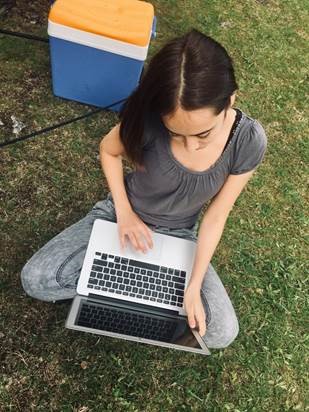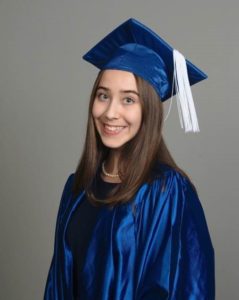
Maya Washburn found a refuge at Florida Virtual School, where she was able to satisfy her hunger for knowledge and curiosity and explore new ideas.
Editor’s note: This post from Florida Virtual School graduate Maya Washburn first published on Project Forever Free, a platform of brightbeam. You can read a redefinED story about Washburn here.
The COVID-19 pandemic that forced scores of public and private school students out of their classrooms and into online learning has had predictably uneven results given that so many were in uncharted territory. I was fortunate: For the last four years I have been a full-time online high school student studying at Florida Virtual School (FLVS), from which I graduated in May.
Educators around the nation looking for ways to improve their online learning would be wise to consider learning from FLVS.
Florida Virtual School sounds like a new concept, but it was founded in 1997 as the country’s first statewide K-12 virtual public school. FLVS, which is based in Orlando, operates as its own school district.
Over its two decades, FLVS students have successfully completed nearly 5 million semester courses, and not just in the Sunshine State – it has served students in all 50 states as well as more than 100 countries and territories around the world. Today, FLVS offers more than 190 courses, from core subjects to electives, and is available to full- and part-time students from public, private, charter and homeschool backgrounds.
FLVS’s funding is determined by successful course completions rather than time spent in a seat. That gives students, teachers and parents the flexibility to customize instruction to each student’s needs. Its graduates perform as well as or better than other students in Florida and the nation in most Advanced Placement course exams.
Count me as one of its many success stories.

Maya Washburn graduated from Florida Virtual School in May.
I enrolled in FLVS as a ninth-grade student trying to rebuild my education. In elementary and middle school, I sat quietly in brick-and-mortar classrooms with so much to say, yet I remained silent for fear of being ridiculed by classmates, and sometimes even teachers. I chose FLVS eager to begin a new, improved educational journey where I could thrive on independent, personalized study. My best work in elementary and middle school was when I was free to complete assignments on my own. It was the work done in class, surrounded by the distracting chatter of classmates and the sharp ring of the school bell, that held me back.
FLVS became my refuge. Each day, I satisfied my hunger for knowledge and curiosity to explore new ideas, all while being cheered on by my ever-supportive teachers and administrators. I discovered new facets of myself, and my passions.
I was independent, but not isolated. I had frequent one-on-one meetings with my teachers, who guided me academically and personally. For example, after seeing that I was placed in an Honors Pre-Calculus course my senior year, I initially shied away. I was excited to expand my mathematics expertise, but foggy memories of past math struggles in middle school led me to believe that I didn’t truly belong in the honors course.
After sharing my concerns with my instructor, she encouraged me to look through the course material, tackle some practice problems, view lesson recordings from the past school year, and treat the first week as a sort of “trial week” before I fully committed. I was comforted that my teacher believed I was more than capable of handling the course even before it began. If I had signed up for it in a traditional classroom setting, I don’t believe I would’ve received the personal attention that boosted my confidence and helped me succeed. In this case, I might have even ended up dropping the course.
Having teachers believe in me even before I believed in myself has made a world of difference.
Although learning from home, I still enjoyed many of the same extracurricular activities as the typical high school student does. I participated in six of the more than 50 clubs FLVS offers: Student Council, Mega News Network (which I helped found), National Honor Society, National English Honor Society, Virge Literary and Arts Magazine, and Glee Club. These clubs regularly meet both online and face to face, which has helped cultivate a hands-on connection with my peers.
Nothing speaks to the value of FLVS’s flexibility more than my extended travels in Europe with my mother. During the six weeks in the fall of my junior year spent exploring and learning in Norway, Sweden, England, the Czech Republic, Hungary, Austria, and Slovakia, I never missed a beat of leading Student Council meetings, completing my coursework, and reporting for the Mega News Network, all while reviewing it with my homeroom teacher. My classrooms became trains, ferries, coffee shops, restaurants, hotel rooms, and even campsites. All I needed to maintain my studies were my laptop and a reliable WiFi connection.
When geography and time do not hinder tests and club meetings, the opportunities for education are virtually limitless. FLVS shows how robust remote learning can be, and how it can be tailored to meet the individual needs of students without sacrificing teacher support and a social life.
Educators have the summer to ponder how to re-open schools amid COVID-19 concerns. Many proposals include models that combine brick-and-mortar attendance with remote instruction.
Meanwhile, a recent USA Today poll found that 6 in 10 parents say they would be likely to pursue at-home learning options instead of sending their children back to their brick-and-mortar school this fall.
Nearly a third say they are “very likely” to do that. They will need more than hastily assembled lessons streamed on Zoom.
While FLVS has benefited me, I understand that virtual school may not be the perfect fit for everyone. I had a friend who started FLVS with me our freshman year, but she soon returned to a brick-and-mortar classroom because she discovered she learned best in that environment. Education involves finding
what works best for your learning style and applying that to your everyday life.
For students whose full-time needs aren’t being met by traditional methods, or who need a part-time supplement to their traditional school, FLVS offers a blueprint on how remote learning can succeed.